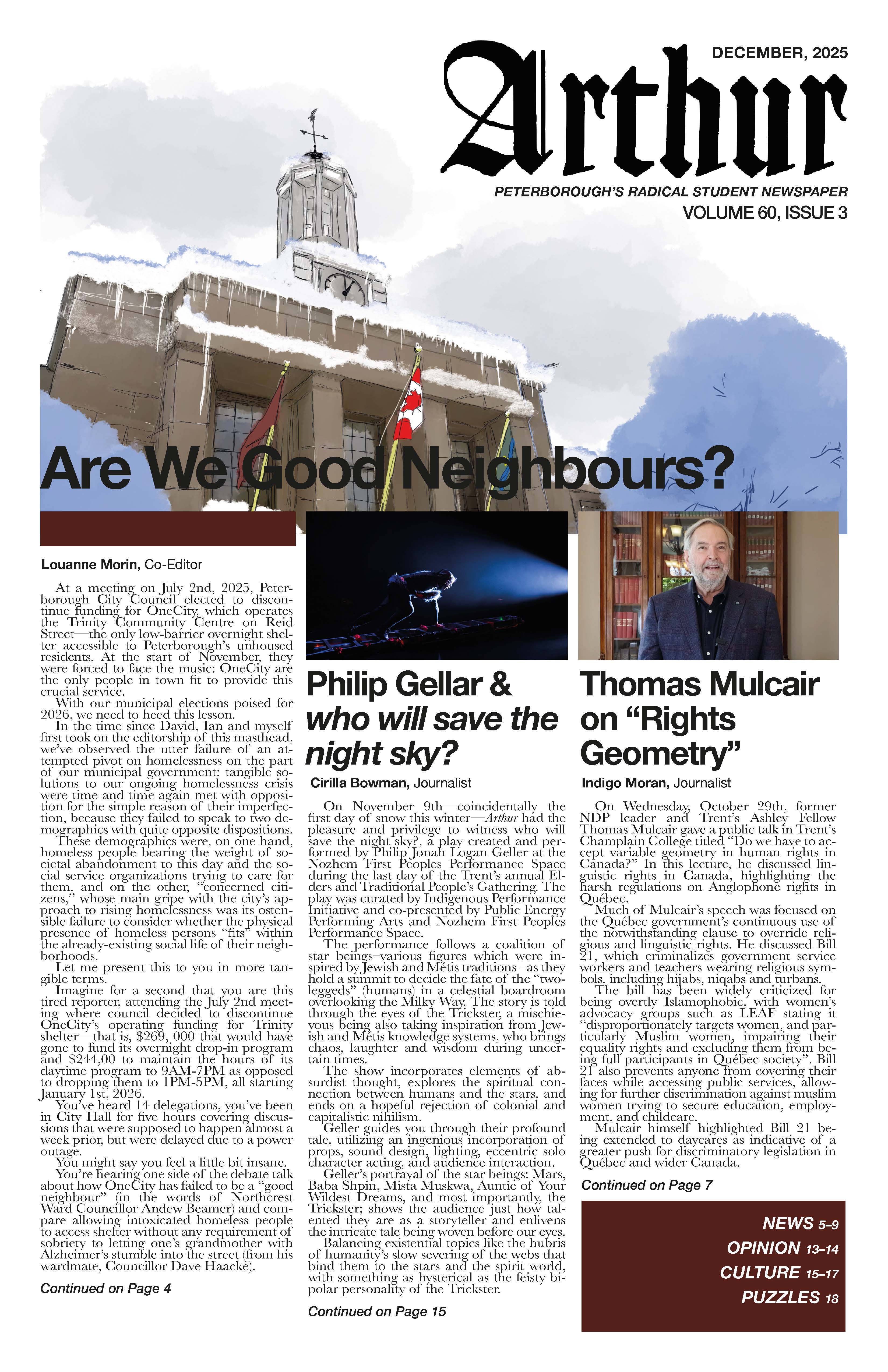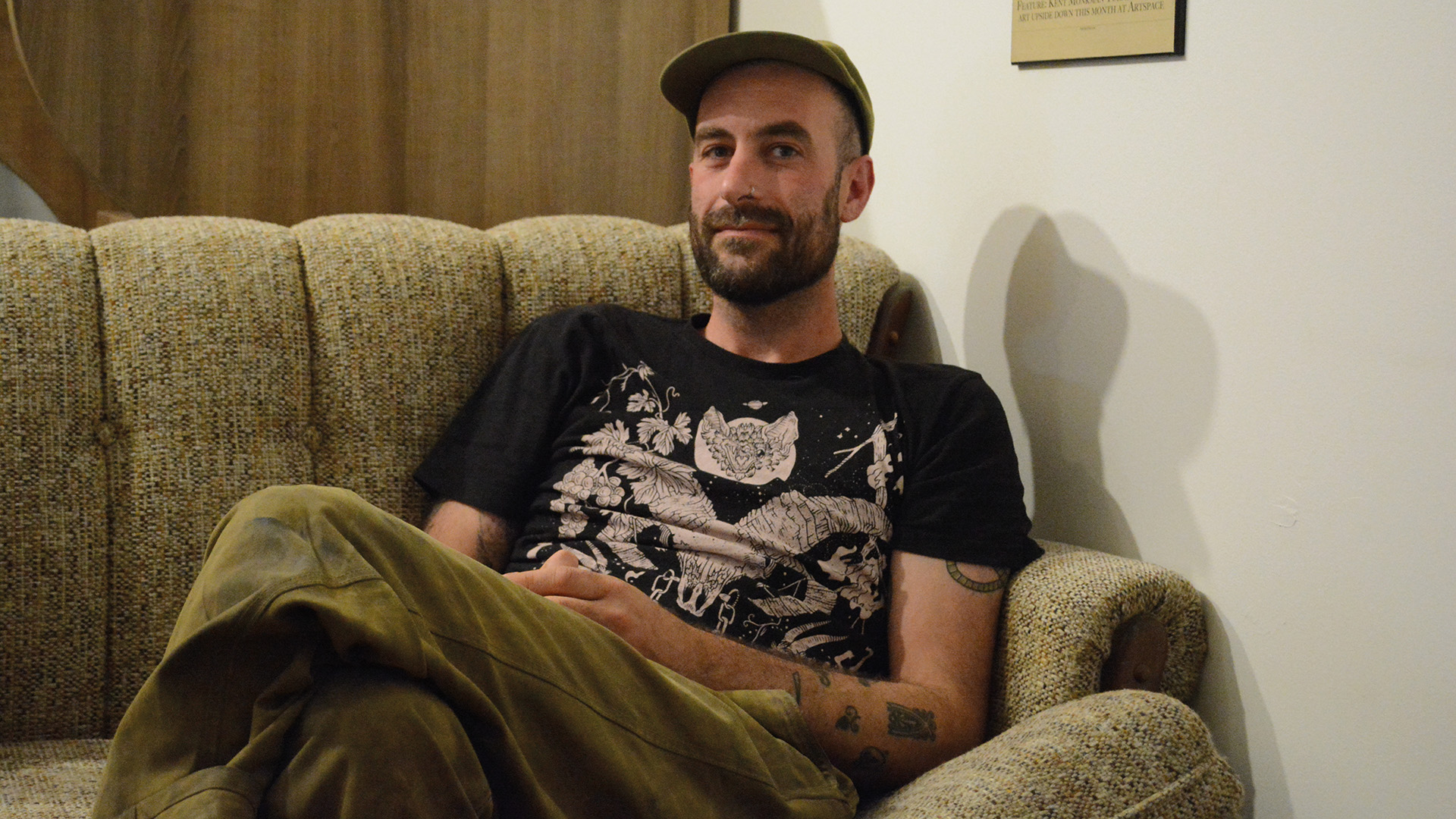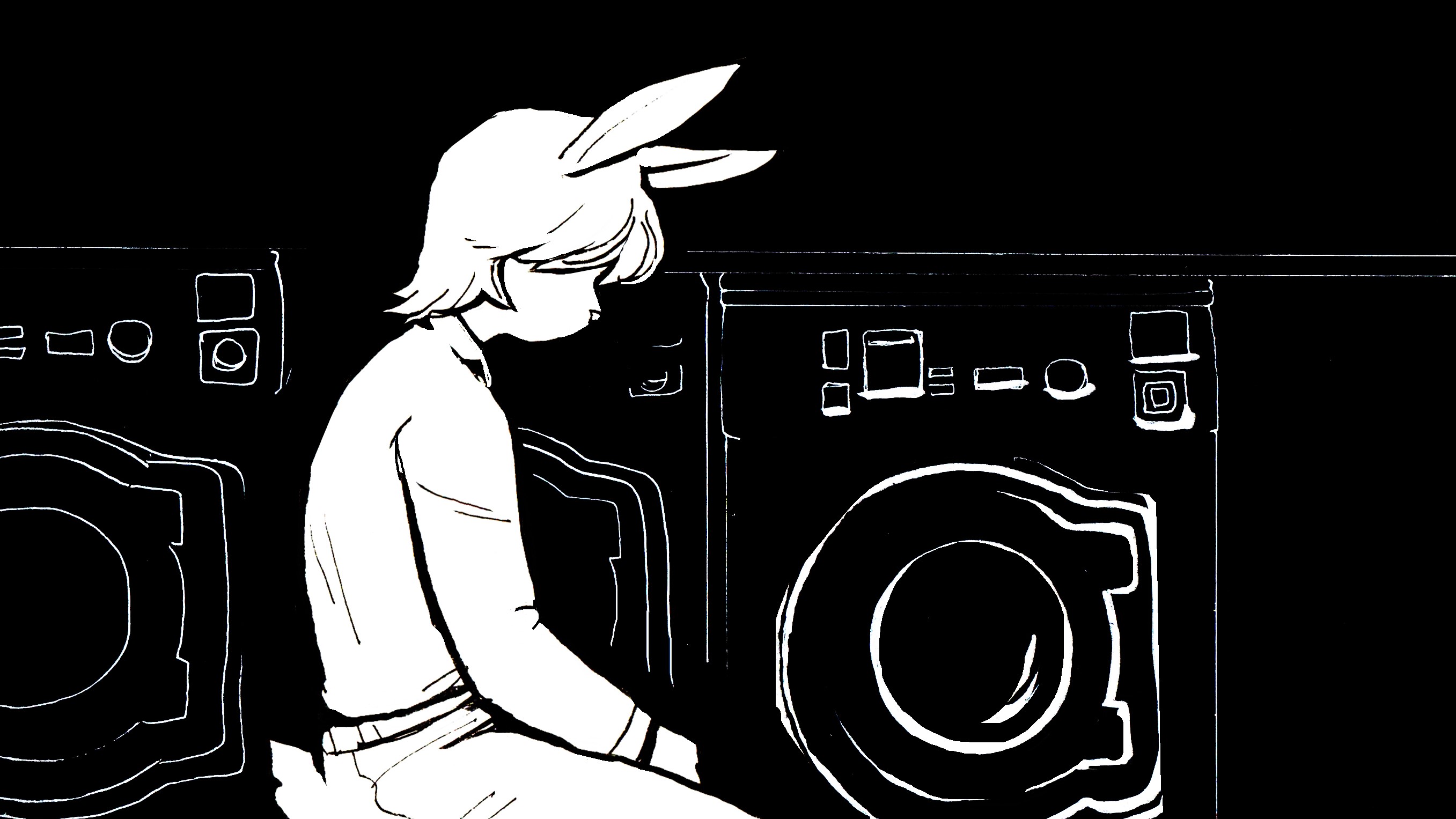In 2019, the York University chapter of the Canadian Federation of Students (CFS) took Ontario to Court regarding the legality of the Student Choice Initiative (SCI). The Student Choice Initiative was a government policy that made student fees optional. As a result of the loss of student fees many campus services, student unions and student groups suffered. Though CFS was initially successful in striking down the SCI, the Province filed an appeal of the decision. On March 23rd this year, the Ontario Court of Appeal began appeal hearings.
On March 23rd, CFS hosted an event where people could watch the court case in a separate zoom meeting and share their thoughts and clarify confusions during the breaks in the case. There were a number of speeches about the SCI’s impact from student leaders and messages of hope. Attendees rallied around the message: “Students United will never be defeated.”
Arthur reporters, Spencer Wells and Robert Gibson spoke to Sébastien Lalonde, Chairperson of the Canadian Federation of Students (CFS Ontario) on the Federation’s notes on this appeal case:
Robert Gibson: Any first impressions so far?
Sébastien Lalonde: My initial impression was that I was nervous at first about how it would go. Inevitably we don’t know [what will happen] with a whole new panel of judges and the different levels of court proceedings are going to go. But overall, having seen the way the judges responded and interacted with the Ontario government lawyers, it definitely brought a little spark of hope in the potential that we may get another unanimous decision in favor of deeming the Student Choice Initiative (SCI) unlawful. However I will say that our lawyers are very keen to highlight that we won’t know what the outcome of the case will be until the judges come forward with their final decision. I was really happy to see students mobilize and come together to discuss the impacts of the Student Choice Initiative looming over us, as we try to discuss the budgets of student associations for the coming year. It was a great show of solidarity, and I hope for the outcome to be in the favor of the students.
Spencer Wells: You mentioned how you noticed the reactions of the judges on the government lawyers, are there any other impressions you would like to give on their arguments?
SL: It seemed like the arguments they were trying to bring forward were specifically about the financial aspect and the savings that students could find from the SCI. They claimed that there were more savings to be found beyond what students were even paying but didn’t seem to be able to provide the reasoning or proof of that claim. There’s also the question of jurisdictions in the [Ministry of Education] putting forth a policy in place of legislative amendment, and they were really struggling to justify the SCI legislation. The judges didn’t seem to entertain that, which frankly was hopeful for us.
RG: Are there any lines that stood out to you from the court case that day?
SL: One of my favourite quotes was from Chief Justice Fairburn, who asked the government lawyers to “live in reality” when referring to public services choosing not to accept the ministry’s funding when it’s available to them - trying to argue that they have the power to reject public funding.
SW: Where do you think the government got that impression from in the first place?
SL: I think where they got that was just from the fact that they want to defend the idea that a policy coming out of the executive branch of our government – being the Ford government – is a policy that could supersede actual legislation which allows the existence of our universities through the Ontario Colleges Act. So where they pulled it out of… I’m not entirely certain. This is them trying to really reach far in ways of overstepping their power and jurisdiction.
RG: I know that democratic rights were brought up during the court case. Can you talk about how the Student Choice Initiative affects those democratic choices in the student bodies?
SL: Absolutely, so we look at our student unions and organizations as a whole – they’re able to take stances that aren’t always congruent with what the administration, being the ministry and governments, end up taking. The reason our student governments are able to take those positions is because they are independent, autonomous organizations from the institutions. They are a conglomerate of students who have come together to vote democratically to allow for general representation, the capacity for lobbying, campaigns, services, and so on. Those are the rights we are talking about, for students to be able to organize themselves, and advocate on behalf of the needs of other students. As much as we would love to think that our colleges and universities have their students’ backs, we know that’s not always the case, and so a lot of this work which betters campus life (including food banks, equity centres, sexual violence prevention centres) comes out of our student unions which are levy funded. The need from students to have those services readily available to them is so important, and that is exactly what the Student Choice Initiative threatens.
SW: What are some of the other comments you have received from students/student organizations on the matter, and what are some of the intricate changes you have noticed (or were informed of) about how the SCI has shifted the capacity of their operations?
SL: I guess if I were to section off the ways that the different branches the SCI has affected, we could start with media – student journalism including campus newspapers, radio, and any other services that allow for the dissemination of information, is now under threat. Were talking about all the different equity aspects that either come from student unions or other levy funds – everything to do with anything like our Queer centres, sexual violence prevention centres, Black student associations and other cultural groups. It’s also the community that those student groups offer for those on campus, and also the advocacy that comes with that work. It's not just that it affects students whether or not they are on campus – what we want folks to realize is that whether or not this past year is a great example, if you ever set foot on campus, you benefit from the advocacy of the student union. Whether that’s the academic advocacy for example, in making sure there is a pass/fail option at the end of the term because of the pandemic, that’s something that students benefit from whether they know it or not. At the end of the day, the small amounts that students end up paying – whether it's $8 or $9 dollars let’s say – per semester, those offer really essential services that end up being cost-saving at the end of the year. I come from the York University Federation of Students, and we have a lawyer on hand, and the costs that would incur from that service will never be on the part of students individually since everyone pooled their funds together. Those funds also help run services that students may need to use one day or another, when they need access to things like food services, and practically everything else needed to get through all other aspects of life, stay available.
RG: How would you respond to someone who doesn’t feel they need or will use any said service, and whether they would ask “why would I pay for it?”
SL: As student organizations, we are meant to serve our members, and they should know what services they have the right and capacity to access. The fundamental problem is in asking “do the students know that these services exist and are they accessible?” I think there’s a few ways we could go about this; on the one hand, a student may say “I’m never going to use this service” but in a four-year degree, nobody could really know that. If they ever reach a point of financial precarity throughout their studies, there are services and ways of support and help from their student associations. That is the whole point of being able to organize because these services exist should they need them, whether in the future or urgently, and the capacity for students to mobilize and pool funds together is what these unions are about. To think about these services through an individualistic approach means that we wouldn’t be able to offer such strong services. The SCI has dismantled a lot of the services that existed, and because of the threat of underfunding, we need financial security to continue operating them. From their first day on campus to the last, whether how many years that takes, we need to make sure that security is there. The other aspect of this is the bulk services that are offered by the unions during orientations. Folks might not realize that they are planned by student associations, and not the universities themselves. They give out a lot of free materials that students can use throughout the year. Everything from notebooks, health and dental plans, stationary items like pens and paper, and anything students can use to access their education wholeheartedly.
SW: What more can the CFS do to promote a participatory aspect in the legal processes, and to engage in a discussion that allows students to recognize the vital role they play in influencing these changes?
SL: I think in any other year what we would be doing as the CFS is to go to each one of our campuses, talking to students throughout the year and making sure we have outreach for them to follow us on social media, and create awareness for ongoing projects. Just like every organization, we struggled to find the best way to fully engage with our members online, but with using apps like Mural to post sticky notes for those following and reacting to the case, we are looking at more ways to get creative. We're seeing student unions and clubs also innovate ways to stay creative and retain engagement from members and students as a whole. I think there are definitely opportunities for cross-hosting and helping to bridge the connection between different locals even if they aren’t geographically close. When the SCI was announced, we worked to start the Retain your Membership campaign, which we brought to all of the CFS locals across Canadian campuses, making sure that outreach was there and that students understood what was at stake with the Initiative. We asked them to sign a petition showing the government that this isn’t what students want, and that its not the government’s stake to claim. Of course, that evolved when we took them to court in 2019 and the appeal – so that revved up the campaigns of getting students involved and informed. We did a briefing and debriefing on Zoom before the appeal case to bring students together and hear some perspectives, and also build up that community the same way we did when we had the first in-person court case. Overall it's been difficult to organize online but we owe it to our members to find the most creative and accessible ways of getting involved.
RG: At one point in the court case, there was a mention that Doug Ford referred to students as “Marxists” – do you have any comments on that? [See article here:]
SL: We are absolutely a non-partisan organization, open to and are working with many different parties because our mandate is already given to us by our members. Not that we are going to be tied to any particular political party, but we will speak out against any policy that is not in favor of students. So comments along the lines of “Our student unions are up to some crazy Marxist XYZ…” from the Premier is unacceptable, inappropriate, and an absolute targeting on students. So that is why we used that statement as an argument in court because we recognize that type of rhetoric is dangerous for students, and obviously motivated our actions against the Student Choice Initiative.
RG: If in the event that you don’t win the appeal, is the Federation prepared to enter the next level of the legal process (ie. The Supreme Court, etc.)?
SL: If in the unfortunate case that does happen, I can’t say for sure what will happen. We would have a conversation with our lawyers about what next steps could be taken, but you can be sure we're not going to take it lying down and allow the SCI to take place. We're going to keep the pressure, keep fighting for students’ rights no matter what the outcome is, and that could take many forms, but we're feeling hopeful about a positive outcome for us.
Be sure to follow the Canadian Federation of Students on Facebook, Twitter and Instagram for more updates on the ongoing appeal case, as well as other student news across Canada.


.png)


.jpg)


.jpeg)



.jpg)



.jpg)









.png)